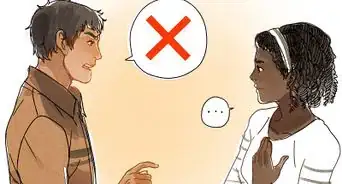This article was co-authored by Julia Yacoob, PhD. Dr. Julia Yacoob is a Licensed Clinical Psychologist practicing in New York City. She specializes in Cognitive Behavioral Therapy (CBT) for adults coping with a variety of symptoms and life stressors. Dr. Yacoob earned an MS and Ph.D. in Clinical Psychology from Rutgers University, and pursued specialized training at Weill Cornell Medical College, New York Presbyterian Hospital, Memorial Sloan-Kettering Cancer Center, the Institute for Behavior Therapy, and Bellevue Hospital Cancer Center. Dr. Yacoob is a member of the American Psychological Association, Women’s Mental Health Consortium, NYC Cognitive Behavioral Therapy Association, and Association for Cognitive and Behavioral Therapies.
There are 16 references cited in this article, which can be found at the bottom of the page.
This article has been viewed 140,451 times.
One the greatest obstacles in life is self-acceptance. Though it is difficult, learning to be okay with who you are is perhaps the most crucial thing you need to do to be happy. No matter what your life has dealt you, you have the opportunity to accept yourself and learn to like who you are.
Steps
Learning to Love Yourself
-
1Be your own friend. Often we set higher expectations for ourselves than we do for others. Try instead to treat yourself the same way you would treat a close friend. Don't say anything about yourself (out loud to others, or even just in your head) that you wouldn't say about someone you care about.[1] [2]
-
2Celebrate your strengths. Scientists have proven that by focusing on developing and appreciating our strengths, we are more likely to live fulfilling lives. [3]
- Make a list of three of your strengths. These can be specific (such as, “I am good at chess”) or broad (such as, “I am courageous”).
- Include at least one specific and one broad example on your list.
- Stop and appreciate these parts of yourself. Say out loud, “I like that I am courageous.”
- Brainstorm one way to further develop each of these strengths. If you listed “I am good at chess,” consider entering a chess tournament. If you listed “I am courageous,” perhaps go white water rafting.
Advertisement -
3Forgive yourself. If you are not okay with being you, there may some guilt living under the surface. Accept your limitations and embrace who you are.[4] Forgiving yourself is not easy, but it can be transformative. In order to try to forgive yourself, perform a ritual release.[5]
- Write a letter confessing your secret. Explain everything you feel guilty about in vivid detail.
- Destroy the letter. Send it into the ocean or burn it.
- Say to yourself, “I put my guilt in the past.”
- Repeat this ritual as many times as you need to.
-
4Be kind to yourself.[6] Many people have internalized the belief that taking care of yourself is selfish. When in reality, being kind to yourself is one of the most responsible things you can do.[7] If you take better care of yourself, you will begin to feel worthy of such care. As a result, you will soon be okay with being you. Here are some ideas:
- Set specific times when you don't work. Give yourself permission to relax during these moments.
- Work out. Get those endorphins pumping! When you do make it to the gym, thank yourself for showing up.
- Get enough sleep. Don't sacrifice this essential human need. Plenty of sleep will help you stay physically and emotionally strong.
-
5Make an affirmation. An affirmation is a simple, positive, present tense statement about yourself. Think of such a statement and use a dry erase marker to write it on your bathroom mirror. Say it out loud first thing in the morning, and again every time you enter that room. It is okay to feel silly at first! This feeling will pass, and in time, this will help you be okay with being you. Some examples include:
- I am a good writer.
- I am a strong person.
- I love you, ____ (fill in your name).
Discovering Yourself
-
1Discover your unique preferences. Uniqueness is what makes someone interesting, attractive, and confident. Begin your journey to self-acceptance by creating a list of things that you enjoy. Try not to let the opinions of others influence this list.[8]
- What type of music do you like?
- What sorts of food do you enjoy?
- Which colors appeal to you?
- What types of clothing do you like?
-
2Develop your style. In order to be okay with being you, you must embrace and cultivate what “being you” looks like. Look over the list of preferences you created, and put it into action.[9]
- Put together an outfit like the one you saw in the magazine.
- Download some new music from an artist you like.
- Order some food from a restaurant you love.
- Try to do at least one thing every day that is uniquely you.
-
3Expand your horizons. Chances are you have only been exposed to a tiny fraction of what life can offer you! Deepen your pool of preferences by finding new things to love and new ways to express yourself.[10]
- Travel someplace new.
- Try a fashion, food, or music that you've never tried before.
- Try to do something once a week that is new.
-
4Express yourself. Tapping into your creative side will bring you more in touch yourself. Finding a channel for your unique flow will help you connect with yourself and others, heal old wounds, or just have fun. The only person you need to impress is yourself![11] In time, this creative outlet will further help you accept yourself.
- Keep a journal.
- Go dancing.
- Make a collage.
- Do this once or twice a week.
-
5Get in touch with your core values. Sit down and make a list of your five core values. Do you believe in integrity or honesty? It is straightforwardness or kindness? Could it be boldness or style? By honing in on your core values, you will have a better grasp on what you need to be okay, as well as what you need in a friend.[12]
Opening Yourself to Others
-
1Look at who you surround yourself with. If the people around you are negative and judgmental, this may make it difficult for you to accept yourself. [13] Seek people in your life who are supportive. Seek people who appear to be okay with themselves. Minimize the time you spend with people who complain constantly or instigate unnecessary drama.[14]
-
2Create a support system. Building a network of supportive people is essential to being okay with yourself.[15] This could be a more formal network, like a literal support group led by a therapist, or a more informal gathering of friends.[16] By empathizing with others, you also improve your ability to empathize with yourself.
- Attend a meeting or organize a gathering where your friends can come together and receive support.
- Do this at least once a month.
-
3Do something nice for others. Scientists have proven that not only are we happier when we are nice to others, but we actually live longer! Being nice to others can help you be okay with being you.[17] Make an effort to do something nice for others without expecting anything in return, and soon you'll be more okay with you.
- Compliment the cashier's jacket.
- Give up your seat on the bus.
- Volunteer your time at a soup kitchen.
- Kind gestures can be small or large.
-
4Practice gratitude. Anytime you feel self-doubt creeping in, change gears and focus on gratitude instead. List five things you are grateful for in that moment. Take a moment to really pay attention on each one: how does it feel to have that in your life?[18]
- Think about a physical attribute that you like. Do you have great hair?
- Think about an aspect of your personality. Are you good at school?
- Think about a person in your life. Are you close with your mom?
-
5Aim for acceptance. When we are not okay with ourselves, we are often not okay with others.[19] This equation works both ways. If you let go of judgment and try to accept others, you will soon start accepting yourself. If you find yourself making an assessment of the actions, choices, or identity markers of someone else, just let it go. Remind yourself that it's not your concern.
Warnings
- Don't be over-confident or conceited and expect to be okay with yourself.⧼thumbs_response⧽
References
- ↑ Julia Yacoob, PhD. Clinical Psychologist. Expert Interview. 11 August 2021.
- ↑ http://www.huffingtonpost.com/nathalie-thompson/how-to-stop-being-a-perfectionist_b_7205844.html
- ↑ https://www.happify.com/hd/heres-how-to-celebrate-your-personal-strengths-and-why-youll-be-happier-if-you-do/
- ↑ Julia Yacoob, PhD. Clinical Psychologist. Expert Interview. 11 August 2021.
- ↑ http://www.oprah.com/spirit/Deepak-Chopra-How-to-Forgive-Yourself_1
- ↑ Julia Yacoob, PhD. Clinical Psychologist. Expert Interview. 11 August 2021.
- ↑ http://www.mindbodygreen.com/0-18828/heres-what-happens-when-you-start-being-nice-to-yourself.html
- ↑ http://www.huffingtonpost.com/rena-delevie/quiet-confidence-wins_b_6116706.html
- ↑ http://www.collegefashion.net/fashion-tips/5-tips-to-help-you-develop-your-own-personal-style/
- ↑ http://www.huffingtonpost.com/2014/09/26/stepping-outside-your-comfort-zone_n_5872638.html
- ↑ http://tinybuddha.com/blog/3-tips-get-out-of-head-start-expressing-yourself/
- ↑ http://www.prolificliving.com/the-greatest-discovery-of-all-getting-to-know-yourself/
- ↑ http://www.mayoclinic.org/healthy-lifestyle/stress-management/in-depth/positive-thinking/art-20043950?pg=2
- ↑ http://www.apa.org/helpcenter/road-resilience.aspx
- ↑ http://www.apa.org/helpcenter/road-resilience.aspx
- ↑ http://psychcentral.com/lib/therapists-spill-12-ways-to-accept-yourself/
- ↑ http://www.helpguide.org/articles/emotional-health/improving-emotional-health.htm
- ↑ http://www.helpguide.org/articles/emotional-health/cultivating-happiness.htm
- ↑ http://zenhabits.net/open/
About This Article
If you’re trying to work out how to be okay with being you, start by learning to be your own best friend so you can look after and feel good about yourself. You can do this by treating yourself the same way you’d treat someone you care about, like a best friend. For example, if you say things like “I’m stupid” or “I’m ugly”, then ask yourself: “Would I say that to my friend? No, so why am I saying it to me?”. Once you realize this is not a nice way to treat yourself, stop doing it by reminding yourself every time that it’s your mean voice and you’re not going to listen anymore! And instead, tell yourself what you’re good at, like: “I’m a great basketball player” or “I’m an ace at math!”. For more advice from our Counselor co-author, including how to find your own values, keep reading!














































































